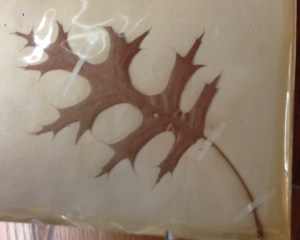Once a month, my town’s Conservation Commission holds a Conservation Coffee where residents can get together with the conservation team for an informal discussion of current issues. To keep things interesting, the event is held in various venues around town. I hadn’t managed to get up early enough to attend any of these before, but I’d always wanted to visit the Thoreau Institute, so I managed to drag myself out in time for last Thursday morning’s event.
I have to admit that I’m a little confused by all of the various Thoreau-related organizations we’ve got around here. There’s the Thoreau Society – they run the gift shop at Walden Pond, set up lectures and tours, run the Friends of Walden Pond, have an archives of Thoreau scholarship (which is housed at the Thoreau Institute), and they hold an annual Gathering. Then there’s the Walden Woods Project, which was founded by musician Don Henley when development threatened Walden Pond. They are dedicated to preserving the land around Walden Pond, and also manage the Thoreau Institute, which is mainly dedicated to operating the Henley Library, a comprehensive library of Thoreau-related material. So they all seem to get along and work together, but sometimes it’s hard to tell which is which.
Our coffee was held in this very impressive house, located at the end of a narrow private road about half a mile from Walden Pond. Constructed in 1906 by the founder of the Boston Symphony Orchestra, it has been lived in by the founder of the Sheraton hotel chain and descendents of John and John Quincy Adams. But now it’s the headquarters of the Thoreau Institute. The main hall of the house is pretty impressive, with a huge fireplace that must have been about 30 feet wide. The library is located in a newly-constructed building across the courtyard.
We got to meet with the head naturalist of the Walden Woods project and had an interesting discussion of vernal pools, and also discussed other conservation issues currently relevant to the town. Then we got a tour of the library, located in a separate newer building across the courtyard. The main reading room was an amazing space, almost a shrine to Thoreau.
This photo of the main reading room just doesn’t do it justice. Full of light from expansive windows looking out onto the surrounding forest, beautifully-made furnishings, and many exciting items on exhibit.
Here are closeups of some of the details:
The compass rose table inlay, made from many different types of wood, intended to symbolize Thoreau’s work as a surveyor.
 The custom-made chandelier, featuring trees carved in wood around the perimeter.
The custom-made chandelier, featuring trees carved in wood around the perimeter.
 The carpets featured a rich tapestry of plants that grow in the area.
The carpets featured a rich tapestry of plants that grow in the area.
The glass cases around the perimeter had many interesting displays and I just didn’t have time to study everything. I really need to go back sometime to take a closer look. But here are a few I snapped photos of.
 This bust of Henry David Thoreau was based on the drawing of him as a young man.
This bust of Henry David Thoreau was based on the drawing of him as a young man.
 There were many things in his handwriting, including the famous survey drawing of Walden Pond, but I rather liked this little note that he wrote as a student at Harvard. (A printed version of the text is shown below.)
There were many things in his handwriting, including the famous survey drawing of Walden Pond, but I rather liked this little note that he wrote as a student at Harvard. (A printed version of the text is shown below.)
 This scarlet oak leaf was part of a collection of specimens that he collected and mounted. Below is some words her wrote about the shape of the scarlet oak leaf. It illustrates his powers of observation and his love of the natural world.
This scarlet oak leaf was part of a collection of specimens that he collected and mounted. Below is some words her wrote about the shape of the scarlet oak leaf. It illustrates his powers of observation and his love of the natural world.
All of this left me with mixed feelings. The building was beautiful and carefully designed in a lovely arts-and-crafts style, with many references to the natural world. Approached as a temple to a man whose influence was so far-reaching, it seemed right and fitting. On the other hand, when considered as a monument to a man whose motto was “Simplify” and who lived for 2 years in a 10′ x 15′ cabin he made himself from materials costing $28.12, it seemed a little bit opulent. What do you think?
As one last little item that left me somewhat astonished, it was mentioned to us that the organization had a half-million dollar piano that they’re offering for sale as a fundraiser. (Actually, it’s now been marked down to $420,000.) We were allowed into the climate-controlled room in which it currently resides. It is a custom-made Steinway grand piano that features inlaid wood plaques of natural scenes and one of Thoreau’s most famous quotes inlaid around the perimeter. And it’s been signed by several famous people who have played it. So if you know someone who has a spare $420,000 lying around and would like to have a unique Thoreau item, have them contact the Thoreau Institute. (An informative article about the piano can be found here.)








